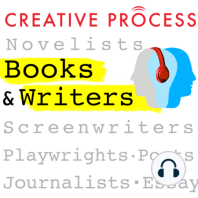12 min listen

ROB VERCHICK - Leading Climate Change Scholar - Author of The Octopus in the Parking Garage
ROB VERCHICK - Leading Climate Change Scholar - Author of The Octopus in the Parking Garage
ratings:
Length:
51 minutes
Released:
Sep 11, 2023
Format:
Podcast episode
Description
Rob Verchick is one of the nation’s leading scholars in disaster and climate change law and a former EPA official in the Obama administration. He holds the Gauthier-St. Martin Eminent Scholar Chair in Environmental Law at Loyola University New Orleans. Professor Verchick is also a Senior Fellow in Disaster Resilience at Tulane University and the President of the Center for Progressive Reform, a research and advocacy organization that advocates for solutions to our most pressing societal challenges. He is the author of numerous articles and books, including The Octopus in the Parking Garage. A Call for Climate Resilience.“I was an English major in college. But here's the thing. I believe that the strongest machine we have, the strongest empathy machine that we have is literature. The best way to get people to feel what someone else is feeling is through literature and stories. And I also think that feeling and emotion are an important part of reasoning and governing too. It's not the only part, but I think you have to understand how people see the world and how they feel about the world. So in my classes, I teach law classes. I teach policy classes. I often assign novels. We read in one of my classes Their Eyes Were Watching God, the case about a hypothetical hurricane in Florida written by Zora Neale Hurston. We read Oryx and Crake by Margaret Atwood, which is a kind of dystopian novel that involves climate change. We've read The Handmaid's Tale in my classes. But I think what these books do is they, number one, certain books that are speculative, like Margaret Atwood's work, Joyce Carol Oates has written some things like this too. What's interesting about them is that they make us, they open up our imaginations and say, Oh, I never thought something like that could happen. We hope it doesn't, but it could, right? And so how do we change the way we look at the future? And it also changes, I think, the way that we understand people's lives.So even in a book like Their Eyes Were Watching God, which takes place in the early 20th century, and obviously involves race issues and a whole lot of other things. It leads us to think and see the world through a young black woman's perspective in the early 20th century. And there's something about that exercise of being able to some extent put yourself in the shoes of somebody else that I think is really important for governance. I think it's really important for policy. I think it's really important for advocates of any kind because listening and trying to understand what another person is perceiving...You can never do it completely, obviously, but I think it is really one of the most important parts of collective action of working with other people.”https://robverchick.comhttps://works.bepress.com/robert_verchickwww.progressivereform.org/Twitter/X/Instagram/Facebook: @robverchick @robsoctopusbookwww.creativeprocess.infowww.oneplanetpodcast.orgIG www.instagram.com/creativeprocesspodcast
Released:
Sep 11, 2023
Format:
Podcast episode
Titles in the series (100)
Highlights - Bertrand Piccard - Explorer, Founder, Solar Impulse Foundation - Author of "Realiste": Conversation on profitable climate change solutions, Solar Impulse Flight, spirituality, changing legal framework and norms by Books & Writers · The Creative Process: Novelists, Screenwriters, Playwrights, Poets, Non-fiction Writers & Journalists Talk Writing, Life & Creativity